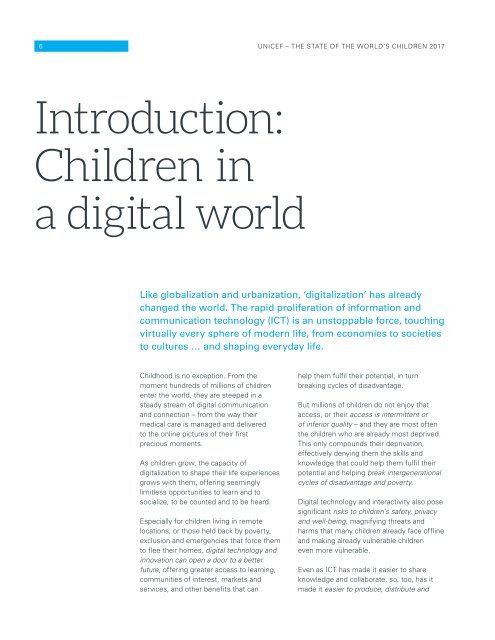SOWC_2017_Summary_En_WEB_FINAL
Create successful ePaper yourself
Turn your PDF publications into a flip-book with our unique Google optimized e-Paper software.
6<br />
UNICEF – THE STATE OF THE WORLD’S CHILDREN <strong>2017</strong><br />
Introduction:<br />
Children in<br />
a digital world<br />
Like globalization and urbanization, ‘digitalization’ has already<br />
changed the world. The rapid proliferation of information and<br />
communication technology (ICT) is an unstoppable force, touching<br />
virtually every sphere of modern life, from economies to societies<br />
to cultures … and shaping everyday life.<br />
Childhood is no exception. From the<br />
moment hundreds of millions of children<br />
enter the world, they are steeped in a<br />
steady stream of digital communication<br />
and connection – from the way their<br />
medical care is managed and delivered<br />
to the online pictures of their first<br />
precious moments.<br />
As children grow, the capacity of<br />
digitalization to shape their life experiences<br />
grows with them, offering seemingly<br />
limitless opportunities to learn and to<br />
socialize, to be counted and to be heard.<br />
Especially for children living in remote<br />
locations, or those held back by poverty,<br />
exclusion and emergencies that force them<br />
to flee their homes, digital technology and<br />
innovation can open a door to a better<br />
future, offering greater access to learning,<br />
communities of interest, markets and<br />
services, and other benefits that can<br />
help them fulfil their potential, in turn<br />
breaking cycles of disadvantage.<br />
But millions of children do not enjoy that<br />
access, or their access is intermittent or<br />
of inferior quality – and they are most often<br />
the children who are already most deprived.<br />
This only compounds their deprivation,<br />
effectively denying them the skills and<br />
knowledge that could help them fulfil their<br />
potential and helping break intergenerational<br />
cycles of disadvantage and poverty.<br />
Digital technology and interactivity also pose<br />
significant risks to children’s safety, privacy<br />
and well-being, magnifying threats and<br />
harms that many children already face offline<br />
and making already vulnerable children<br />
even more vulnerable.<br />
Even as ICT has made it easier to share<br />
knowledge and collaborate, so, too, has it<br />
made it easier to produce, distribute and


